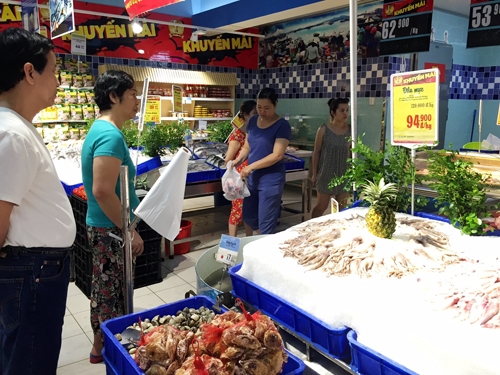 Society
Society

Food service enterprises must apply for food safety and hygiene permits, but many enterprises complain it is too hard to get permits due to complicated procedures.
 |
| Customers purchase sea food at BigC Supermarket in Hà Đông District, Hà Nội. Food service enterprises must apply for food safety and hygiene permits, but many enterprises complain it is too hard to get permits due to complicated procedures.– Photo baotintuc.vn |
HÀ NỘI – Food service enterprises must apply for food safety and hygiene permits, but many enterprises complain it is too hard to get permits due to complicated procedures.
Hoàng Ngọc Tuấn, who lives in HCM City’s District 10, founded a restaurant in 2014. But he still has not completed procedures to get a food safety and hygiene permit.
His restaurant is operating in the district’s Lý Thái Tổ Street without a food safety and hygiene permit. He worries that he could be fined if the restaurant is inspected.
To get a permit, enterprises must have a lot of different papers, such as the owner’s good health certificate, certificate of food safety and hygiene training, and commitments related to food safety.
The most complicated procedure is that a food service enterprise must have a report proving its infrastructure and food processing ensure food safety and hygiene.
Because of the difficulties, many enterprises must pay fees for law companies to help them apply for the permit. Research conducted by a Vietnam News Agency correspondent shows each enterprise must pay VNĐ20-30 million (US$800-1,300) to a law firm to get a permit.
The Director of the HCM City Department of Food Safety and Hygiene, Huỳnh Lê Thái Hòa, said the city now has about 60,000 food service enterprises. The number of food enterprises is so large, that food safety and hygiene standards have not achieved targeted goals yet, he said.
The city does not require food safety and hygiene permits for small restaurants or street vendors. Such places only need to commit to ensuring food safety. But if they violate food safety regulations, they are fined.
Relevant experts say the documents guiding the implemention of the Law on Food Safety and Hygiene by concerned ministries and sectors were insufficent. There is a lack of guidance on collecting fees confirming one’s understanding of food safety. Inspection and punishment of small restaurants was not enforced strongly enough. — VNS




